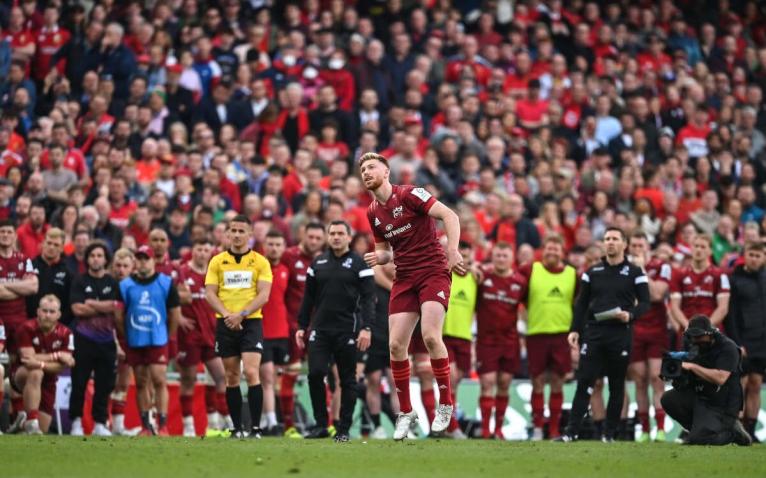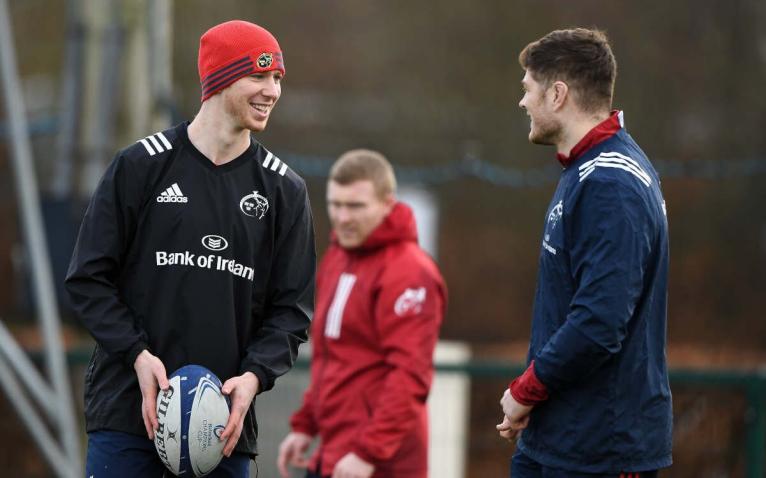For a nation of emigrants, there is a certain irony in the fact that most human traffic in Irish rugby has travelled in one direction. From CJ Stander to Bundee Aki, Jamison Gibson-Park to Mack Hansen, the No1 ranked side in the world has made good use of rugby’s residency rule as well as its diaspora.
For context, Healy represented Ireland all the way through the age grades.
But it’s not just that.
Those branches of his might be reaching toward the sun but his roots are in Tipperary, in the parish that jockey Charlie Swan, who guided Istrabraq to Champion Hurdle glory in the 90s, came from, and where a figure from history lends his name to the local GAA club.
Thomas MacDonagh was a leader in the 1916 Easter Rising, a signatory on the proclamation, the first document to declare an Irish Republic and propose breaking away from British rule. That name is enshrined in national history and growing up as a child, even before he first played rugby, Healy would have worn a crest with Thomas MacDonagh emblazoned on his hurling shirt.
You can’t overlook the significance of that background when you examine the seismic nature of what happened earlier this month. To some, a switch in allegiance by an uncapped player who has dropped to third in the Munster pecking order, may not seem that big a deal. But that’s now. What happens if Healy plays for Scotland against Ireland in this year’s Six Nations or World Cup? What happens if he lands one of those clutch kicks, like he did in the final moment of Munster’s game against Ulster a few weeks ago?

Anyone who has ever been to MacDonagh Park, the homely GAA pitch in rural Tipperary, will know this decision hasn’t been taken lightly because this ground, named after an Irish patriot, has a legacy of making champions. Healy just wants to be the next one. Who would have believed, though, it would be in a blue shirt rather than a green one?
Sean Skehan had his fears. Any coach with serious ambitions in Irish rugby knows the pathway to a career in the pro ranks has to start in the schoolboy game.
That was where Dubliner Skehan first ran into Tipperary’s Healy.
There they were, master and pupil, like everyday actors relocated from the set of Friday Night Lights to Glenstall, one of Irish rugby’s best nurseries. “After every game, like within an hour of it, Ben and another player would knock on the door of my office, asking to begin a review,” Skehan says. “He was acting like a professional from the time he was 15.”
They’ve remained close ever since, Healy attending Skehan’s wedding, and had planned to be at his stag night as well, only for that day to turn sour when he missed a couple of key kicks in Munster’s Champions Cup quarter-final defeat to Toulouse.
Mentally Ben is really resilient, happy to bide his time. But opportunities arise in rugby. Jack took his.
Sean Skehan
You can pinpoint that game as the one when the slide began. Until then, Healy was Munster’s Ross Byrne, their week-to-week No10 in the URC, back-up option to Joey Carbery on the bigger days.
Had one of those kicks drifted in rather than out against Toulouse, then who knows where he’d be right now? Would Andy Farrell rather than Gregor Townsend have made the call? Sometimes fate interferes with your plans.
As Healy’s career temporarily stalled in the summer and autumn of 2022, Jack Crowley’s took off. Farrell brought him to South Africa with the Emerging Ireland squad and then, when Sexton and Carbery went down in November, it was Crowley who stepped up.
It was a turning point. Healy could still deliver – his performance for Munster in their November victory over South Africa proved that – but margins are tight at the top end of the pro game. Sexton is first choice, Carbery second. The race for bronze has been busily contested for years, Paddy Jackson holding that spot for a bit, then Billy Burns, Ross then Harry Byrne, Jack Carty, Ciaran Frawley, now Crowley.
“Mentally Ben is really resilient, happy to bide his time,” says Skehan. “But opportunities arise in rugby. Jack took his.”

And all of a sudden Healy stopped getting big games for Munster.
You could say that stems from Johann van Graan stepping out and Graham Rowntree stepping up as Munster coach but even at the start of this season, changing coaches didn’t immediately lead to a change of the guard. You had Mike Prendergast running the Munster attack, Prendergast the one-time Grenoble backs coach who had worked with Healy one summer when the then schoolkid jetted off to France for a run out with the French side.
But as Munster transitioned to a new style in September, teething troubles emerged. Healy got dropped, Crowley got his chance, Carbery’s injuries cleared up and over in Edinburgh, Gregor Townsend scrolled through the contacts on his phone.
It was two years since he first spoke with Healy whose mother is Scottish.
Then it was Glasgow who were interested. They offered to pay Healy six-times what he was earning at Munster before the Irish province responded by surpassing Glasgow’s initial offer.
Glasgow came back a second time with an even bigger contract.
He is a unique character, really confident in his ability. Put it this way, when you are a forward and you are coming out of a maul or scrum and you see a ball spiralling its way into the opposition 22, it’s a good feeling.
Jack O’Donoghue, Munster backrow
“Life changing figures,” says Skehan, who is now more friend than mentor to his former captain and out-half. “Ben, being the good kid he is, just really wanted to give something to his parents. ‘I can pay them back here,’ he was saying.
“So, when Glasgow came back with their third offer, I actually advised him to go,” says Skehan, “because the difference … the difference was huge.”
But Healy stayed. There was a sense of loyalty to where he was from, for sure, but also a belief it would happen for him with Munster and Ireland.
Tom Hayes, the former Exeter captain, noted that iron-clad belief when he worked with Skehan at Glenstall.
“Straight away, within hours of me arriving at the school, Ben was looking for a meeting because he wanted to drill me for information on Exeter’s attack,” says Hayes, “because he knew their shape was different to the 1-3-3-1 or the 2-4-2 patterns that others used.”

By early last moths Townsend’s feeling was that he could get Healy this time.
And you can see why he’d make the sales pitch. He and Finn Russell have never been a mix, never a match. Blair Kinghorn is a fine operator but arguably better in the backfield than in the control centre while Adam Hastings’ injury profile could become an issue.
All that could open a door for Healy who reminds Skehan, in stylistic terms, of a very young Sexton.
“Gregor is more of a Joe Schmidt type coach, who has his clear pitch mapping, his beliefs in what Scotland should do in every strike play. That requires a lot of contact time with the outhalf to get your message across. Joe had that with Johnny at Leinster. Gregor now has Ben Healy in Edinburgh and no doubt sees a young ten who has all the attributes to control a game.
From an Irish perspective, in five years time will we think, ‘jeez, what have we done? Why did we let this guy go?’ I think he will be a big loss to us, a big Six Nations player for Scotland. We might regret losing him.
Sean Skehan
Like many proposals, it happened around Christmas. After Townsend went down on one knee, Healy spoke with Andy Farrell. There was a straightness and honesty to the conversation which comes as no surprise to anyone who knows both men.
By the end of that chat, Healy knew it wasn’t going to happen for him with Ireland in this World Cup cycle. Scotland could offer more than a contract, also a cap, and the chance for Healy to be Edinburgh’s franchise player.
They put concrete terms out there quickly perhaps knowing Exeter Chiefs and Leicester Tigers had both expressed an interest. Munster would have been happy to keep him; Healy would have been happy to stay. But he believes Edinburgh can make an impact in the URC and in Europe. He believes too he has the tools to make it in the international game.
“He really wants to try international rugby as much as possible and I think his game will really suit that,” says Skehan. “From an Irish perspective, in five years time will we think, ‘jeez, what have we done? Why did we let this guy go?’ I think he will be a big loss to us, a big Six Nations player for Scotland. We might regret losing him.”


Comments
Join free and tell us what you really think!
Sign up for free